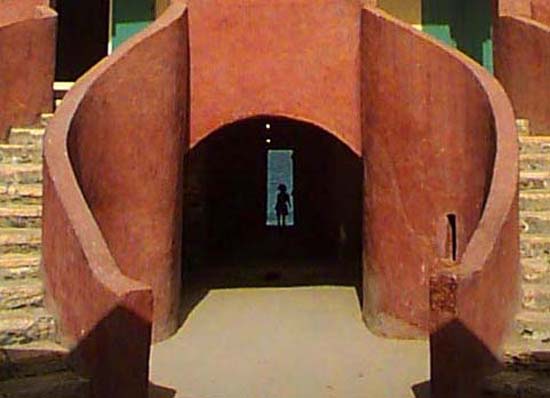
"In four months I’ll be home and the village will still be here. When I first arrived it seemed incomprehensible that I could ever go back to America, much less go back to living as I had before. How could I just walk away from these people who were so quickly friends and family? How can I ever again take for granted what Aldous Huxley describes as “the unthinking and almost unresentful acceptance by millions of my less fortunate fellow-beings of my claim to be educated, leisured, comparatively wealthy”? What gives me the right to condemn killing a cat with rocks when I indulge the other extreme, providing a pet cat in the U.S. with medical care beyond the reach of any of the children in my village family? Is putting a cat to sleep with expensive drugs and then burying her in the backyard garden next to gerbils and goldfish any less absurd? B. Kite writes, 'What are the limits of empathy? Certainly if we were wholly to open ourselves to suffering it would be impossible to function in the daily world. That path leads to isolation and/or sainthood. Yet the issue of where those limits can securely be placed is unresolvable; its provisional resolutions make up the moral task of a lifetime.' Fully confronting our culpability in workings of the world is overwhelming and unsustainable. But I can’t shake the feeling that allowing oneself the distance to analyze is also permitting oneself to slowly forget. I don’t want to forget."
Senegal Peace Corps Volunteer Claire writes: Guilt and Empathy
This is a must read!
Filed under: Peace Corp — July 10, 2006 @ 2:26 pm
This sums up so much of my experience, my thoughts, and emotions in Senegal. This is directly taken from Clare Major’s website. She is another PCV in Senegal COSing in November. Please read and feel free to visit her outstanding website at www.claremajor.net. Joel, I KNOW this is long, but you need to read it, it’s hilarious.
[Excerpt]
empathy
Mid-afternoon in May is the hottest part of the hottest time of the year. In the village, where there are no electric fans and no ice water, we are simply waiting it out. The kids play Uno and everyone else sits around in the shade, talking and napping. I’m lying on a wooden bed under the neem tree, reading a book.
Suddenly, two or three of the guys yell and take off for the nearest hut. It takes me a minute to figure out that they have spotted the feral cat that had been lurking around the compound since the day before, ambushing chickens. The other boys and men jump up, grab rocks and sticks, and join the chase with excited whoops.
The hut and its backyard are now surrounded by men and boys, projectiles in hand, hoping to corner the cat inside. I make a choice. I stand up, go in my hut, and close both doors. I don’t want to see whatever’s going to happen.I can hear a crowd of kids gathering and can tell by the yelling that the cat has escaped that yard and made a dash for another compound. The kids and men run in a joyous, screaming mob from one end of the village to the other, following the cat. This is probably the most exciting thing that has happened all week.I stand in my hut sad and angry both with them and with myself. I’ve seen this before—lizards attacked simply because they’re moving targets, birds turned into live pull toys—and my reaction is still the same. I am sickened by this cruelty but simultaneously ashamed that I am judging them. I grip the back of my chair and focus on not crying.
* * *
The question is not so much what do I feel guilty about as it is what have I managed to not feel guilty about—yet. Jogging in the morning? The luxury of recreational exercise. A cereal bar for lunch? Friends who can mail snack-food across an ocean. A trip to Dakar? Disposable income and mobility. A pet dog? Food and money that should go to people. The fact that I can and will leave after two years? Betrayal. Maybe it’s just residual Catholicism, but all of my anger, my homesickness—feeling sorry for myself—reminds me of what a privileged, opulent life I can lead simply by some accident of birth.Add to that the Peace-Corps-ingrained guilt about taking breaks from the village, not working 24 hours a day on new and innovative projects, slacking on Pulaar, and ever spending time in my hut for any reason whatsoever—and, stupidly enough, I find myself feeling angry that I’m guilty and guilty that I’m angry.
* * *
Outside, the chase is still on, coming back towards my compound. I hear a thud against my back door and I know. I know, but I have to see anyway. I look through the crack between the door and the frame and the cat is crouched there, looking up at me, eyes wide with terror. I step back and stand in my dark hut. I want to open the door, to let him in and hide him. But then what would I do? I’d have a wild cat in my hut who I’d, what, sneak out in the middle of the night and release in the fields? He’d just end up back here, and in the meantime I’d have to explain why I was sheltering a chicken killer.The yelling men and screaming children surround my backyard. A large rock thumps against the door, and I hear cries that it’s “in Djenaba’s douche” and then, “It’s dead! It’s dead!” One of the older men comes to my hut to tell me the cat is in my douche. I go look and don’t see anything on the fenced-off slab of concrete.My family explains that it was a wild cat, not a village cat, and had been eating chickens since the night before. They know I’m upset—they tell how a previous volunteer got angry when her village killed a puppy that had eaten chickens. And they repeat that the cat’s in my douche. I say that I looked and didn’t see it. They say, no, no: IN my douche. I scoff; there’s no way the cat would have gone through that tiny hole (four and a half inches—I measured) into a pit toilet.That night, however, I go look, angling my flashlight through the hole so that I can see the bottom, about six feet down. My stomach clenches when I see him—clean white fur, lying in that perfect crescent moon cat shape. He silently stares up at me, his giant saucer eyes reflecting the light.
The cat’s in my douche. The goddamn cat is in my goddamn douche.
That’s how desperate he was. He had to squeeze himself through that tiny hole and drop six feet into mud, trash, and worse because it was the only way to escape the flying rocks and sticks.
I look again but I can barely stand to see his eyes glowing back up at me. He must be seriously injured or in complete shock—he doesn’t even open his mouth to meow, just lies motionless. The next night he has changed position but is still just staring silently. It feels like an accusation. What can I do? Even if there was an easy way to reach him, I’d never manage to get him back through the hole. Do I demand that the men bring out the family shotgun? Do I just leave him there to die of heat and starvation? And in the meantime?
I literally have to shit on the cat.
It took him four days to die. Fewer for the smell to go away. In four months I’ll be home and the village will still be here. When I first arrived it seemed incomprehensible that I could ever go back to America, much less go back to living as I had before. How could I just walk away from these people who were so quickly friends and family? How can I ever again take for granted what Aldous Huxley describes as “the unthinking and almost unresentful acceptance by millions of my less fortunate fellow-beings of my claim to be educated, leisured, comparatively wealthy”?
What gives me the right to condemn killing a cat with rocks when I indulge the other extreme, providing a pet cat in the U.S. with medical care beyond the reach of any of the children in my village family? Is putting a cat to sleep with expensive drugs and then burying her in the backyard garden next to gerbils and goldfish any less absurd?
B. Kite writes, “What are the limits of empathy? Certainly if we were wholly to open ourselves to suffering it would be impossible to function in the daily world. That path leads to isolation and/or sainthood. Yet the issue of where those limits can securely be placed is unresolvable; its provisional resolutions make up the moral task of a lifetime.” Fully confronting our culpability in workings of the world is overwhelming and unsustainable. But I can’t shake the feeling that allowing oneself the distance to analyze is also permitting oneself to slowly forget. I don’t want to forget.


















